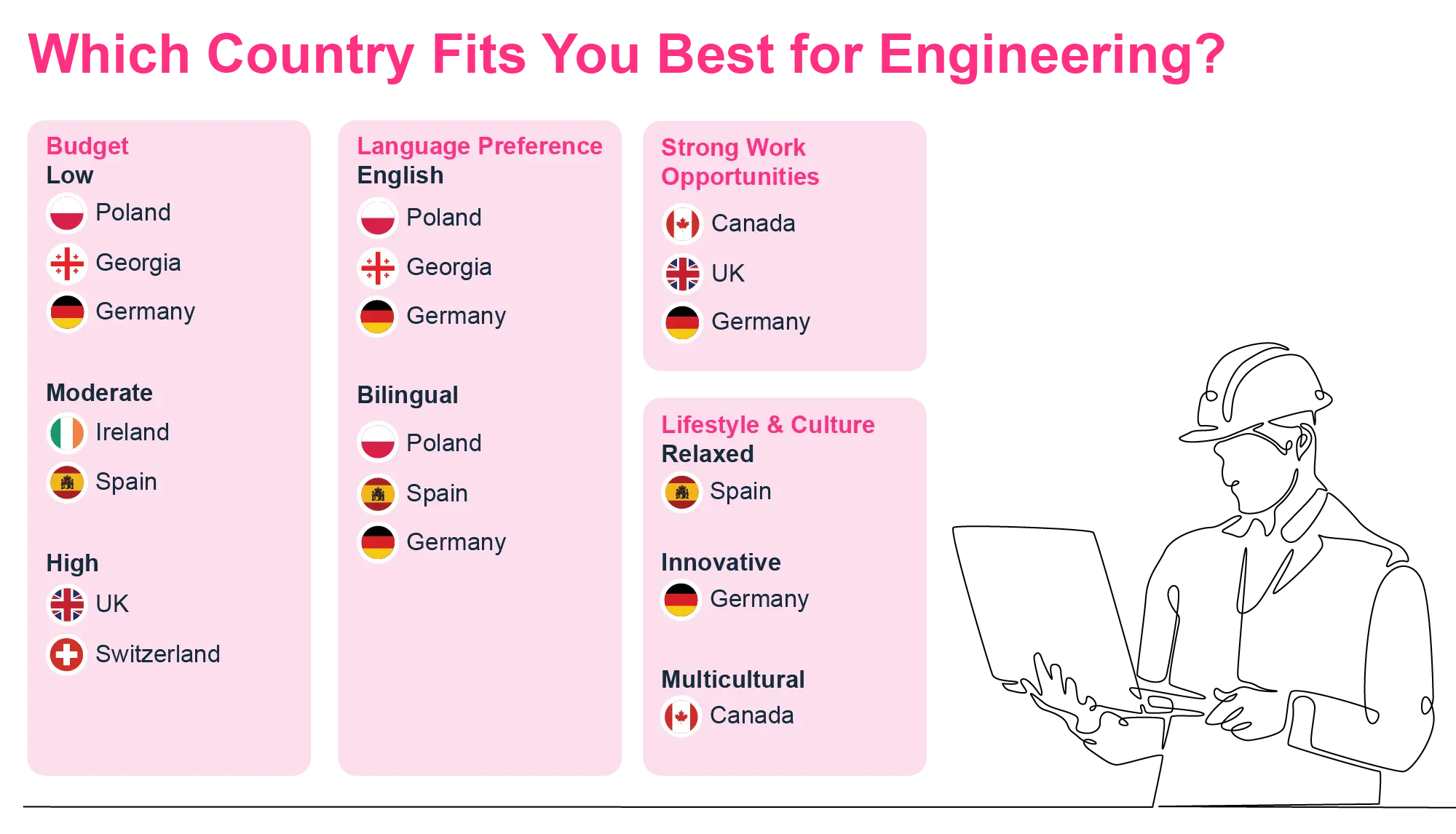ACT Exam Explained- Complete Study Guide | MetaApply IE
Best Study Abroad Destinations for Engineering Students

Imagine standing in front of a flight gate with your boarding pass in hand. The flight isn’t just to another country; it’s to a new version of you. One where your engineering dreams turn into real-world innovation, one class, one internship, one project at a time.
That’s what studying engineering abroad really means. You can earn a degree from anywhere, but simply picking up a random destination may not be fruitful for your career, it’s about choosing a country that matches your ambition, supports your learning style, and opens doors after graduation.
So today, let’s cut through the endless lists and brochures. Let’s talk about destinations that matter, countries where engineering education is practical, globally recognised, and career-enhancing.
Here’s your clear, easy-to-understand guide to the Best Study Abroad Destinations for Engineering Students, written to help you find the place that fits you.
Why Choosing the Right Destination Matters for Engineering
Studying abroad can redefine your career, but where you go changes everything. The right destination means:
- Access to high-quality, hands-on engineering education.
- Post-study work opportunities to gain experience abroad.
- Exposure to advanced technologies and global industry standards.
- A chance to develop independence, confidence, and adaptability.
Most importantly, your choice decides how easily you can transition from classroom to career.
1. United Kingdom (UK)
When it comes to reputation, the UK remains a global leader in engineering education. It’s ideal for students who want strong academic quality, innovation-focused learning, and solid career pathways after graduation.
Why it’s a top choice:
- Prestigious engineering degrees recognised worldwide.
- The Graduate Route allows you to stay and work for up to two years after finishing your studies.
- Courses often include “sandwich years”, a full year of work experience.
- Cutting-edge research and close links with global companies.
Good to know:
- Tuition and living costs can be high, especially in London.
- Apply early, because top engineering programmes fill up fast.
- Scholarships are competitive but worth exploring.
2. Canada
If you’re after quality education, welcoming culture, and a clear route to post-study work; Canada ticks every box. It’s one of the most popular destinations for engineering students today.
Why students love it:
- Post-Graduation Work Permit (PGWP) allows you to work up to three years after your studies.
- Affordable compared to the UK or US, with excellent research facilities.
- Safe, multicultural environment that values diversity.
- Strong job opportunities in civil, mechanical, and computer engineering.
Good to know:
- Living costs can vary, for example cities like Toronto or Vancouver are expensive.
- Harsh winters in some areas, so location matters.
- Choose provinces that align with your field like Ontario and Alberta are known for engineering roles.
3. Germany
Germany blends high-quality engineering education with low or even zero tuition fees at public universities. It’s a dream destination for students who value practical learning and affordability.
Why it stands out:
- Many public universities offer tuition-free programmes.
- Global reputation for mechanical, automotive, and industrial engineering.
- Direct links to industries like BMW, Siemens, and Bosch.
- Excellent post-study work options, you can stay up to 18 months after graduation.
Good to know:
- Living costs are moderate but can rise in big cities like Munich or Berlin.
- Learning basic German helps with part-time jobs and internships.
- Admission is competitive, apply early with complete documents.
4. Switzerland
Think of precision, innovation, and high-quality living, that’s Switzerland. Engineering students here get access to cutting-edge research, great pay during internships, and strong connections with top industries.
Why Switzerland is a hidden gem:
- Exceptional quality of life and advanced infrastructure.
- Focus on precision engineering, robotics, and medical technology.
- Research-oriented learning with collaboration from global companies.
- Multilingual and international environment; English-taught programmes available.
Good to know:
- Tuition is moderate but living costs are among Europe’s highest.
- Admission can be selective and competitive.
- Strong portfolios or research interest improve chances.
5. Poland
Poland is one of Europe’s fastest-growing destinations for international engineering students. It offers a mix of affordability, safety, and good education quality.
Why it’s gaining popularity:
- Low tuition fees and affordable living costs.
- Increasing number of English-taught engineering courses.
- Modern campuses with growing tech ecosystems.
- Located in the heart of Europe, with easy travel options.
Good to know:
- Check accreditation before applying.
- Language barrier outside major cities can be a challenge.
- Look for emerging tech cities like Wroclaw or Krakow.
6. Ireland
Ireland may be small, but it packs a big punch when it comes to engineering and technology. With global tech companies setting up headquarters here, it’s a hotspot for engineering graduates.
Why it’s a top pick:
- English-speaking, EU-based country.
- Excellent opportunities in software, electronics, and civil engineering.
- Post-study work visa for up to two years.
- Friendly, safe, and welcoming atmosphere.
Good to know:
- Housing can be expensive, especially in Dublin.
- Fewer universities compared to larger countries, plan applications early.
- Great choice for students interested in tech start-ups or innovation hubs.
7. Spain
Spain combines a relaxed lifestyle with solid engineering education. It’s perfect for students who want cultural richness and affordability together.
Why students choose Spain:
- Affordable living and tuition costs.
- Increasing English-taught engineering programmes.
- Strong focus on renewable energy, infrastructure, and civil engineering.
- Great student life and cultural exposure.
Good to know:
- Spanish language helps in internships and networking.
- Bureaucratic procedures can be slow, start paperwork early.
- Internship opportunities vary by region.
8. Georgia
Georgia is an emerging destination for engineering studies, offering excellent value for money and growing international appeal.
Why it’s worth considering:
- Low tuition and living costs compared to Europe.
- English-taught engineering programmes are increasing.
- Strategic location connecting Europe and Asia.
- Warm, welcoming culture and simple visa process.
Good to know:
- Degree recognition depends on your home country, make sure to always verify.
- Infrastructure and industry exposure still developing.
- Great option for students looking for affordable entry into international education.
9. Russia
Russia has a long tradition in engineering and technology. From aerospace to mechanical and energy, it remains a strong academic option for technically focused students.
Why it’s respected:
- Strong emphasis on mathematics, science, and engineering fundamentals.
- Affordable education compared to Western Europe.
- Opportunities in research and advanced projects.
- English-taught options available for international students.
Good to know:
- Russian language knowledge helps in daily life.
- Some international recognition may need additional verification.
- Consider regions with international collaboration for better exposure.
10. Europe (as a region)
Beyond individual countries, Europe as a region offers flexibility and mobility. You can study in one country and intern in another, thanks to EU agreements.
Why Europe is powerful for engineers:
- Numerous English-taught programmes in countries like Netherlands, Finland, and Sweden.
- -wide mobility through Erasmus and internship programmes.
- Excellent research funding and infrastructure.
- Access to industries across borders.
Good to know:
- Living costs vary greatly between countries.
- Some local languages may be required for internships.
- Excellent long-term employability for skilled engineers.

Quick Comparison Table
| Country | Tuition Cost | Post-Study Work Rights | Language | Job/Industry Access |
|---|---|---|---|---|
| UK | High | 2 years (Graduate Route) | English | Excellent |
| Canada | Moderate | Up to 3 years (PGWP) | English/French | Very Strong |
| Germany | Low | 18 months | English/German | Excellent |
| Switzerland | High | Varies | English/German | Excellent |
| Poland | Low | 1–2 years | English/Polish | Good |
| Ireland | Moderate | 2 years | English | Strong |
| Spain | Moderate | Varies | English/Spanish | Growing |
| Georgia | Low | Varies | English | Developing |
| Russia | Moderate | Limited | English/Russian | Strong |
| EU Region | Varies | 1–2 years | English/Local | Excellent |
Note: Costs and duration vary by institution and location.

Your Next Step
Choosing where to study engineering abroad is a big decision, but it doesn’t have to be overwhelming. You now have the facts, the comparisons, and the clarity.
So, what’s next?
Shortlist your top two destinations based on your goals and comfort, then let us take it from there.
At MetaApply IE, we guide you every step of the way, from selecting your course and country to applying, securing financial aid, preparing for your visa, and getting ready for life abroad. Our expert counsellors simplify every step and make sure nothing is missed.
If you’re serious about building a Career in Engineering, it’s time to make your move.
Fill out the form today for a free consultation and discover your best-fit country for engineering studies abroad.
Frequently Asked Questions
The UK, Canada, and Germany are the most popular due to academic strength, global recognition, and post-study work options.
Germany and Poland offer some of the most affordable or even tuition-free options.
Yes, most countries allow part-time work during studies and full-time work during breaks.
Yes. Germany, Poland, Spain, and several EU nations offer engineering programmes entirely in English.
It varies by country: Canada allows up to 3 years, UK allows 2, and Germany allows 18 months to find a job.


















































